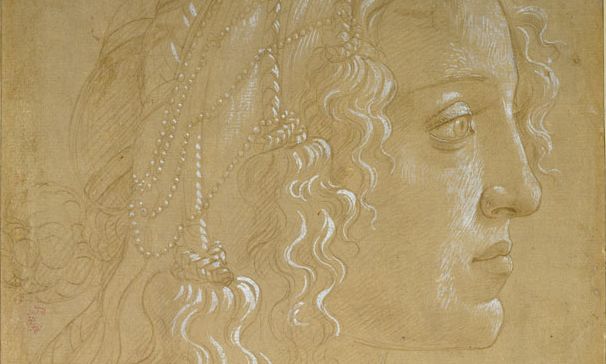Sandro Botticelli's Study of the head of a woman in profile "La Bella Simonetta" (around 1485) was drawn using white gouache on light-brown prepared paper ©️ Ashmolean Museum
The first major exhibition dedicated to the drawings of the Sandro Botticelli (around 1445-1510) will open later this year at the Legion of Honor in San Francisco. The show will feature almost 60 works in total, including five newly attributed drawings by the Early Renaissance master.
“Botticelli is widely known for the elegance of his compositions, the sinuosity of his figures and the exquisite flourishes of their draperies but, remarkably, no exhibition has been dedicated to his preparatory drawings,” says Thomas P. Campbell, the director of the Fine Arts Museums of San Francisco. “In part, this is because relatively few drawings survive and they are dispersed among many collections around the world,” he says. “In addition, the attribution of drawings of this era is a complex process, so it’s a subject that few can engage with, authoritatively.”
Botticelli’s mythological paintings such as Primavera (around 1480) and the Birth of Venus (around 1485) are world renowned, with the iconography of the latter having passed into popular culture. But grounding these paintings is a mastery of drawing, the so-called Florentine disegno, as described by the Renaissance artist and historian Giorgio Vasari, in contrast to the Venetian colorito, building up forms through the layering of colour. “[Botticelli’s] mastery as a draughtsman underpinned the character of his paintings,” Campbell says.
Botticelli's The Devout Jews at Pentecost (around 1505) Hessisches Landesmuseum Darmstadt, Photo: Wolfgang Fuhrmannek.
Among the 27 drawings in the show will be The Devout Jews at Pentecost (around 1505), thought to show the missing half of an altarpiece now in the collection of the Birmingham Museums Trust, and the freshly attributed preparatory sketch for Botticelli’s Madonna of the Rose Garden, which will be reunited with its resultant painting on loan from the Musée du Louvre in Paris.
Furthermore, “for the first time, we will reunite the Uffizi’s Adoration of the Magi to the three fragmentary designs exceptionally on loan from the Fitzwilliam Museum and the Morgan Library,” says the exhibition’s curator Furio Rinaldi. “It will be incredibly insightful, and satisfying, to witness Botticelli’s design process from paper to panel.” The curator also highlights the importance of underdrawings in Botticelli's paintings and an accompanying catalogue will present new scholarship on the subject. “The extensive research and attribution sleuthing carried out leading to the exhibition allowed me to a complete reassessment of Botticelli’s drawing catalogue, his chronology, and workshop practices,” he adds.
Botticelli's tempera and oil on panel Judith with the Head of Holofernes (around 1497-1500) will be on loan from the Rijksmuseum Image: courtesy Rijksmuseum
According to the organisers of the show, fewer than three dozen of Botticelli’s drawings are known to exist. Works on paper that are more than 500 years old are by their very nature fragile and many of the loans will be leaving their home institutions for the first time. Works will be coming on loan from museums including from the Galleria Borghese in Rome, the British Museum and National Gallery in London, the Ashmolean Museum in Oxford and the Rijksmuseum in Amsterdam.
• Botticelli Drawings, Legion of Honor, San Francisco, 18 November-11 February 2024

